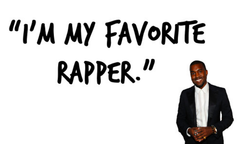
Lately I was thinking that Kampala professionals can be a lot like rappers sometimes with their big talk and bravado. I first thought about this when I read Nada Anderson’s blog about “the self-proclaimed advertising guru” and, on the same day, I was motivated to consider an alternative approach by Simon Kaheru’s blog describing the late General Aronda as the definition of gentility: ‘social superiority as demonstrated by polite and respectable manners, behaviour, or appearances.’
That was about a month ago, but rather than immediately writing about it, I started a series of conversations with my rapper friends (of which I have many more than makes sense for nice young professional muzungu – until you consider my days working at Crystalklear studio).
The question lingering in my mind was: how do you earn respect as a professional in Kampala? Do you aggrandize yourself, or be humble and show your skills? I would prefer to let my work promote itself, promising less and delivering more, but according to what Nada Anderson described of the common Kampala marketing man and what I have seen myself, it seems like a lot of Kampala professionals are acting more like rappers.
That was about a month ago, but rather than immediately writing about it, I started a series of conversations with my rapper friends (of which I have many more than makes sense for nice young professional muzungu – until you consider my days working at Crystalklear studio).
The question lingering in my mind was: how do you earn respect as a professional in Kampala? Do you aggrandize yourself, or be humble and show your skills? I would prefer to let my work promote itself, promising less and delivering more, but according to what Nada Anderson described of the common Kampala marketing man and what I have seen myself, it seems like a lot of Kampala professionals are acting more like rappers.
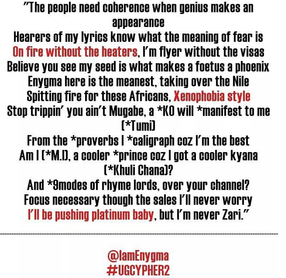
Enygma is one of the smartest rappers I know, and he explained to me that there is a code to hip hop. One of the rules is that you have to believe you’re bringing greatness to the stage – that you’re the best – or else you shouldn’t even pick up the microphone. Arrogance is like your ticket into the game. But I noticed that he is also smart enough to be selective in his claims. Enygma told me that he is the best at word play in Uganda, which I think is a title he can honestly defend.
Abramz Tekya agreed that there is a code to hip hop, but sometimes the basic tenants can seem contradictory. Another important rule of hip hop is to be real. But how can realness coexist with claiming “I am the best rapper on the planet”?
Abramz Tekya agreed that there is a code to hip hop, but sometimes the basic tenants can seem contradictory. Another important rule of hip hop is to be real. But how can realness coexist with claiming “I am the best rapper on the planet”?
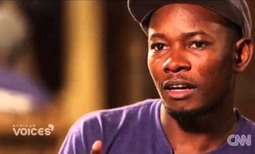
“For me, being assertive is not about lying,” said Abramz, “that is two different things. Take pride in what is yours, but don’t claim titles that are not rightfully yours.” (Note: he still allows a poetic license for metaphorical self-description.)
I had a long chat with GNL Zamba over Facebook about this (which I’ll turn into a blog of its own) and he said: “hip hop artists get trapped by the monster that they perpetuate, and the image they project becomes pressure. I love the pressure when am working, it is motivation, but I hate that it makes you a target. You attract the good and bad.”
I had a long chat with GNL Zamba over Facebook about this (which I’ll turn into a blog of its own) and he said: “hip hop artists get trapped by the monster that they perpetuate, and the image they project becomes pressure. I love the pressure when am working, it is motivation, but I hate that it makes you a target. You attract the good and bad.”
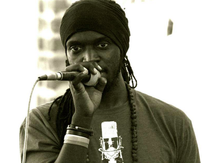
Indeed.
Isn’t it inherently dangerous to make claims about your own value that can be disproven? For example, Babaluku calls himself the God Father of (Luganda) Hip Hop in Uganda, frequently suggesting that he was the first to rap in his mother tongue, and yet anyone who listens to Philly Lutaaya’s Nakuzaana knows that Philly did it first. Sorry, Babaluku, but why rewrite history? Why not just claim your part in it and let everyone else be awesome too?
Isn’t it inherently dangerous to make claims about your own value that can be disproven? For example, Babaluku calls himself the God Father of (Luganda) Hip Hop in Uganda, frequently suggesting that he was the first to rap in his mother tongue, and yet anyone who listens to Philly Lutaaya’s Nakuzaana knows that Philly did it first. Sorry, Babaluku, but why rewrite history? Why not just claim your part in it and let everyone else be awesome too?
I’ve seen the downside of rappers in Uganda allowing their bravado to take over. In mainstream interviews, one will call himself the best rapper of them all. Other rappers will then see this, knowing that there are other talented but unrecognized MCs who are truly much better than the guy whom the mainstream is celebrating that day, and people will start working against the star to expose his lie. Beef is born. Stars then start protecting themselves, even refusing to collaborate with more talented rappers on the same tracks out of fear that they will be beaten in the game they claim to have won.
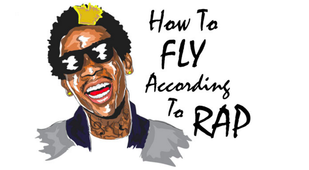 Source: http://infinitelegroom.com/2013/06/03/how-to-fly-according-to-rap/
Source: http://infinitelegroom.com/2013/06/03/how-to-fly-according-to-rap/ I have seen this happen in the professional world as well, where quietly talented collaborators are pushed out by the self-proclaimed Mr. Amazing, so that they can’t have a chance to disprove his claim of superiority. I am big on collaboration, so it’s tragic for me when people see each other as competitors and don’t notice the opportunities. We all have strengths and weaknesses. There is comparative advantage to be leveraged when people of similar interests work together. But it sure is hard to work with somebody when they insist on being the best, especially when it’s all talk and no results.
*drops the mic* (Rappers: if I got this wrong, please let me know)
*drops the mic* (Rappers: if I got this wrong, please let me know)

